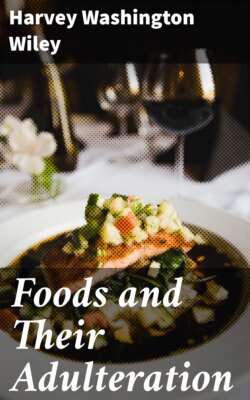Читать книгу Foods and Their Adulteration - Harvey Washington Wiley - Страница 102
На сайте Литреса книга снята с продажи.
GENERAL OBSERVATIONS.
ОглавлениеTable of Contents
It is evident, from the foregoing description of the methods of preparing and sterilizing meat, that it is a process which commends itself both on account of the economy in the use of meat which it secures and because of the nutritive value of the products obtained.
The real value of the products must necessarily depend upon the selection of the raw materials and the sanitary conditions which attend their manipulation. Experience has shown that it is not safe to leave these matters to the packers themselves. While, doubtless, the greater number of packers will exercise all possible care in the selection of the materials and in their preparation, human nature is of such a character that when opportunity for deception, fraud, and illegitimate gains are presented there are always some who take advantage of them. Hence, it may be safely said that no tinned or canned or sterilized meat of any description should be allowed to enter into consumption except when prepared under the inspection of qualified municipal, state, or national officers. The health of the animal furnishing the meat should be ascertained by inspection both before and after slaughter. This inspection should be of the most rigid kind, and all diseased animals should be excluded from entering into standard products. If it be claimed that there are certain diseases which are local only in character and which do not affect the wholesomeness of the whole carcass, special provisions can be made for this kind of meat. If admitted into consumption at all, it should be under a permanent label or tag by which the intended consumer would be informed of the character of the contents of the package.
There is a reasonable doubt respecting the suitability for human food of carcasses of animals afflicted in a moderate degree with tuberculosis, pleuro-pneumonia, lumpy jaw, or other contagious or epidemic diseases. In all such cases the rights of the consumers demand that the benefit of the doubt should be given to them and not to the owner, manufacturer, and dealer in any of the products they consume. Such meat would then enter the market under a separate grade and command a lower price, and when consumed no one would be deceived respecting its character.
It must be admitted, even if such meat be regarded as wholesome, that it is of inferior character, and cannot in any justice demand the right to pass under the name of higher grades of the article. The sanitary conditions under which such meats are prepared are of the highest importance. The slaughter house should be clean, and provided with good ventilation and natural light. The workmen should be free of disease, neatly dressed, and required to observe all necessary sanitary precautions. The débris and fragments of the packing house should be carefully removed and so disposed of as to prevent any suspicion that any part of them enters any of the products of the factory. Municipal, state, or national inspection should be frequent, thorough, and entirely removed from any possible influence of the packing business itself. Competent veterinary experts should pass upon the state of health of each carcass, and any one found diseased in any way should be subjected to a further careful inspection to see whether it should be admitted, under proper label and notification, as human food or consigned to the fertilizer heap. It is only by such inspection as this that the consumer can secure adequate protection. After the meat is once in the can inspection will only reveal whether or not preservatives and coloring matter have been used, or whether the contents of the can are spoiled or in a state unfit for consumption. No examination of the contents of the can will reveal in a satisfactory manner the state of health of the carcass from which the meat has been secured or the sanitary conditions under which it has been prepared. It is hoped the new methods of inspection established by the Secretary of Agriculture will secure the desired purity of meat products.
